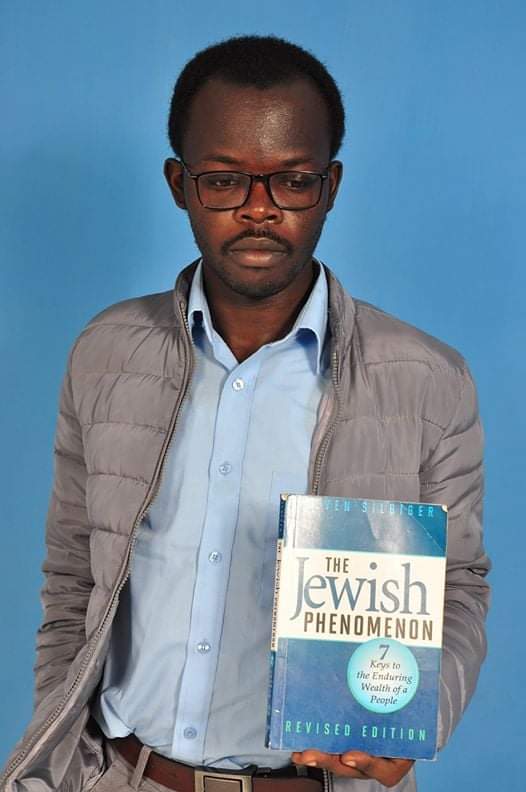By Victor Ochieng’
Jews make up only 2 % of the total United States population. Yet, 45 % of the top 40 of the Forbes 400 richest Americans are Jews. A third of American multi-millionaires are Jewish. The percentage of Jewish households with income greater than $50,000 is double that of non-Jews. 20 % of professors in the Ivy League universities are Jewish. 40 % of partners in the leading New York and Washington D.C law firms are Jewish. 25 % of all American Nobel Prize winners are Jewish.
Actually, this cogent argument is in a heroic book titled the Jewish Phenomenon, where the awesome author, Steven Silbiger, presents 7 Keys to the Enduring Wealth of the Jewish People. The principles are pristine and perfect. They steer clear on life lessons we can apply in order to entice serendipity and fortune.
Foremost, understand that real wealth is portable: It is knowledge. Two, take care of your own, and they will take care of you. Three, successful people are professionals and entrepreneurs. Four, develop your verbal confidence. Five, be selectively extravagant, but prudently frugal. Six, take pride in individuality — encourage creativity. Seven, be psychologically driven to prove something — have the fire and desire to access success.
Ideally, being Jewish comes with cultural, religious, ethnic and nationalistic background that has enabled Jews to become successful in their country, United States, and beyond. To become Jewish means enlisting in a covenant with God Almighty. Judaism is a religion with a strong ancestral component. The provenance of the religion dates back to more than 4,000 years ago, with Abraham, who was already a member of the Caucasian race at the time. He married a non-Jewish woman, Sarah.
Ostensibly, Jews have the right perspective on money. In their own projections, wealth is a good thing, a goal worth to give persistent plus passionate pursuit. Once you earn it, it is tragic to lose it. Judaism does not espouse penury or lack as a virtue as some people with poverty-mentality commonly do. For Jewish founding fathers — Abraham, Isaac and Jacob — enjoyed bountiful blessings of vast parcels of lush land and swollen herd of cattle. So, Jews believe, poverty in a man’s house is worse than 50 plagues. This truth features in the Talmud — collection of books of rabbinical commentary on the Old Testament. Talmud is a treasure trove enshrining wise words. Jews believe they have the prerogative to be different in this wide old world. Judaism sets up a framework that permits Jews to think and act differently.
Then, Jews embrace good education. For indeed, it takes good education and stellar grades to get a well-paying job. It is the legit route for those who long to make moolah, money. The best investment you can make in your future is to get yourself the best education — formal, informal or non-formal. Self-education being the best form so far. On formal education, even if you default on your student loan, nobody can repossess your degree. Gaining knowledge in order to sprout out smarter, brighter and better is a core Jewish value. Ipso facto, it is also true that wealth flows naturally from knowledge acquired, and of course applied appropriately.
No wonder, at a fledgling age, stage, Jews train their children to appreciate wisdom of the written word. Jews meticulously study the Torah, Talmud and Mishna. Torah are the first five books in the Old Testament — Genesis, Exodus, Leviticus, Numbers and Deuteronomy. Talmud enshrines wise words and books of detailed rabbinical commentary on the Bible. The Mishna consists of books codifying the Jewish laws for prayers, religious observance and everyday living.
In actual sense, the Jewish wish is to raise independent children right at the onset when christening them. Then, they admonish their children never to live under the shadow of anyone else. Jewish Americans like to be their own leaders. They follow others only when it suits them. In the Jewish religion, children get the recognition in the synagogue as adults at the age of 15. Jews encourage their children to stand out of the crowd: Walk heads held high.
A classic case is Albert Einstein ― topflight Physicist-cum-Mathematician, whom at age 26, became the creator of the Theory of Relativity that ushered in the Atomic Age. His Jewishness played a pivotal role in this great feat and achievement. During his adulthood, reminiscing on his childhood, he realised he had read popular Science books. Somewhat, Jewish parents are keen on what their children imbibe right from the onset — birth and beginnings. They are keen to build their self-esteem and self-image. Self-esteem is how people feel about themselves, while self-image is how people see themselves. Jewish parents build the ability of children to delay instant gratification. They choose for them the best education possible. They encourage them to value literate habits, hobbies, routines and rituals. Parents ensure that their children watch news and read newspapers with a great deal of zeal and zest.
Again, Jews believe that charity is an obligation rooted in social justice. Support of social justice is a common theme in the Jewish giving because of their age-old history of suffering discrimination. The Talmud says, “Upon what does the world rest? Upon a singular pillar, and its name is — Justice.” The 1906 American Jewish Committee founding statement reads, “Jews cannot attain equality for themselves unless it is assured for all.”
Moreover, verbal confidence is another sweet secret. Most Jewish professionals have silver tongues and great gifts of the gab. They focus on the power of delivering speeches and sermons with confident conviction anchored on a clear conscience. Parents nurture the verbal-linguistic intelligence in their children by encouraging them to ask quality questions. Parents proactively explain new ideas to their children. They have active dinners together as a family. Parents encourage their children to venture into performing arts, public speaking, singing and rendition of poetry.
Consequently, Jews save and spend wisely. They have priorities. They begin with education, money, then, material things. In their bright sight, money is a source of power, and to acquire it without education is utterly dangerous. It can woo a woe. Wealth is more than the power to buy material things. It is power itself. Money means safety and survival. One needs to have the courage to try different things. Doing the same things each day, meeting the same people, travelling the same route — one will rarely encounter useful challenges that help people to visualise things successfully.
In conclusion, learn to pursue your ultimate goal. Nurture an imaginative, creative and innovative attitude. Be open to new or novel ideas. A successful idea must be a viable idea. Present it properly as you steer clear on its impressive implementation. The more ideas you can generate, the higher the probability that a great one can come up. Try new things. Think in new ways. For you can significantly change the outcomes of your life through your own positive actions.
The writer is an avid reader, author, trainer, peripatetic public speaker.






